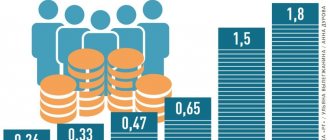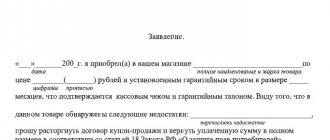Photography and videography: laws and regulations
Let us immediately note that there is no direct ban on photography on store premises in the current legislation. However, there are a number of legislative acts that allow this to be done. For example:
- The Constitution of the Russian Federation, Article 29, paragraph 5 - gives citizens the right to receive, search and transmit information in any way, with the exception of information that is classified as a state secret;
- Code of Administrative Offenses of the Russian Federation, Article 14.9 - gives the consumer the right to receive information about the product, manufacturer, seller and store operations; violation of this right entails administrative liability;
- Federal Law No. 149-FZ, Article 7 - defines the concept of publicly available information;
- Federal Law No. 149-FZ Art. 5 - indicates that information that is a public object of legal relations can be freely used and transmitted.
Of course, these legal acts do not provide direct permission to conduct video filming in a store. However, they guarantee citizens unhindered access to public information. It remains to be seen whether price tags and goods in the store fall under this definition.
Article 29 of the Constitution of the Russian Federation
Article 14.9 of the Code of Administrative Offenses of the Russian Federation “Restriction of competition by authorities, local governments”
Article 7 of the Federal Law of July 27, 2006 No. 149-FZ “Publicly Available Information”
Article 5 of the Federal Law of July 27, 2006 No. 149-FZ “Information as an object of legal relations”
Why is a new law needed?
The bill was developed back in March 2021 by the vice-speaker of United Russia, Irina Yarovaya, and the first deputy head of the faction, Andrei Isaev. As the authors noted in the explanatory note, Russian current legislation “contains a discriminatory provision, according to which collectors are allowed to interact with members of the debtor’s family,” neighbors and people barely known to the debtor.
Related materials:
Bill No. 922037-7
At the same time, Federal Law 230 contains a provision that gives the right to revoke previously obtained consent for the interaction of debt collectors with relatives, friends and acquaintances of the debtor only to the debtor himself. Thus, people who are not involved in the debt unwittingly become participants in a dialogue with debt collectors - in fact, they are forced to communicate with debt collectors, without asking their opinion and without giving them the opportunity to refuse to participate in the debt dialogue.
This issue was submitted for discussion by the Presidium of the Council of Legislators of the Russian Federation at the Federal Assembly on October 25, 2021. Based on the results of the discussion, a new document was developed.
“The fundamental goal of the bill is to restore the violated rights of citizens and establish a procedure that is mandatory for collectors and ensures the protection of citizens from any pressure and undue influence,” the legislators emphasize.
We recommend that you read the Rights of Collectors: What is allowed and what is prohibited for collectors under the new Federal Law No. 230 of 07/03/2016
As soon as the new bill is approved by the Federation Council and signed by the President, collectors will have to curb their appetites and lag behind relatives, friends, neighbors, acquaintances and other persons, because professional collectors will be able to interact with them only with their prior consent. It is logical to assume that there are few people in the country who will sign up for this. Moreover, even if such consent is obtained, it can be withdrawn at any time.
The project was supported by the Ministry of Justice and the Federal Bailiff Service, which oversee the work of collection agencies.
“The adoption of the bill will protect the rights of citizens and unify the procedures for their implementation, ensure the legality of requirements and responsibilities,” the deputies concluded.
Amendments will be made to the Federal Law “On Microfinance Activities and Microfinance Organizations” and will come into force on the date of publication of the law signed by the President. That is, at most, in a few months.
We recommend that you read: How to deal with debt collectors and get rid of loan debt
To shoot or not
Restrictions on access to information are established by Art.
9 of Federal Law No. 149-FZ. In particular, citizens cannot receive information that affects the interests and rights of other persons, the country’s defense capability, or state security issues. For example, if a person takes pictures during a tour of a defense enterprise, he will be legally prohibited from doing so. Another example: a car accident victim is photographed in a hospital bed, thereby violating his right to privacy.
For natural reasons, access to information constituting a commercial or official secret is limited. However, shops and other retail outlets do not fall under any of the above criteria.
Important! The store administration usually explains the ban on filming by internal rules and local regulations. However, such acts must not contradict current legislation.
Article 9 of the Federal Law of July 27, 2006 No. 149-FZ “Restriction of access to information”
What can you shoot?
In most cases, a person removes goods or price tags in a store not out of idle interest: this is the best option to demonstrate the benefits of a product to loved ones, to compare the cost of similar products in different retail outlets.
Let's try to figure out what exactly can be filmed on the territory of the store and how legal the prohibitions put forward by the administration are.
Trademarks and copyrights
This is a rather interesting question: copyright is protected by law, and the administration of retail outlets classifies trademarks and logos as trade secrets.
However, there is one caveat: the law prohibits using a trademark without permission. In particular, if a person makes a copy of a famous brand and puts a print on sportswear, he is breaking the law and will be held accountable. However, photographing logos without the purpose of use is not prohibited by law. This also applies to copyright. The consent of copyright holders to reproduce and use works is required only in the following cases:
- copying designs of buildings and structures;
- reconstruction of computer programs and databases;
- reproduction of books and music in any way;
- recordings of public speeches and their subsequent playback on professional equipment.
It follows that photography and video shooting do not constitute a violation of copyright in goods offered for sale . Of course, if a person photographs a book page by page for subsequent reading or reprinting, the administration has the right to interrupt this action on legal grounds. The store has no right to prohibit taking photographs of the cover in order to share an interesting book with friends.
If there are people in the frame
In such cases, filming can be considered a violation of the right to privacy: Art. 152.1 of the Civil Code of the Russian Federation prohibits the publication or use of images of a citizen without his consent. An exception is made in cases where the filming was carried out:
- in places open to the public;
- for reward.
For the first case, it is important that the captured citizen is not the main object of the composition. The store is a public place, so visitors accidentally caught in the frame do not become the object of an offense.
Download for viewing and printing:
Article 152.1 of the Civil Code of the Russian Federation “Protection of the image of a citizen”
What is a one-day business trip
A one-day business trip assumes that, to carry out a work assignment, an employee is sent to an area from where he can return daily to his place of permanent residence (clause 11 of the Regulations on Business Travel, approved by Decree of the Government of the Russian Federation of October 13, 2008 No. 749).
Whether an employee can return home or not is decided by the head of the company. In doing so, he must take into account:
- how great is the distance from the workplace to the place of business travel;
- the nature of the work performed by the employee at the place of business trip;
- the time an employee needs for proper rest after a business trip.
Why are bans established?
Really, why? There are no regulations in Federal legislation prohibiting photography and video shooting in stores. At the same time, the administration of retail outlets stubbornly continues to post signs everywhere with a crossed out camera.
Let's consider the main prohibitive motives.
The store interior and price tags are a trade secret
This is wrong. The store is a public area, and the prices posted on the shelves are a public offer. Therefore, the administration does not have the right to prohibit taking photographs inside a retail outlet, citing these arguments. Trade secrets can include accounting reports or contracts with suppliers, but buyers are usually not interested in these documents. Moreover, by preventing price tags from being photographed, store management is violating the law, which gives the buyer the right to receive complete and reliable information about goods and services.
Private property
The store is indeed privately owned, however, photographing the merchandise on public display does not in any way affect ownership. If we continue to follow the theory of sellers who make these arguments, then even simply looking at goods can be considered illegal actions.
Private life
This is a more variable topic.
For example, a buyer films a video of the sales floor administrator to record the fact of an offense in order to go to court. It is not considered an infringement unless the footage is used as evidence. In situations where an offended buyer uploads a photo or video of the above administrator online or in the media without the latter’s consent, he is breaking the law and may be held accountable. The reasons for which such a publication was made will not be taken into account.
What will collectors do?
In fact, the new bill is another nail in the coffin of the collection business. However, as practice shows, professional collectors find new effective ways of collecting and continue to receive their money, despite the restrictions.
Forbidden to influence through relatives? Collectors will find a new way to put pressure on the debtor. In the end, no one canceled their right to sue the debtor and collect the debt through bailiffs.
—
Legal settlement
Often, filming in a sales area leads to a real conflict, with twisting of arms and an attempt to destroy the digital media with the captured material. Here you need to remember that store employees do not have the right to:
- conduct personal searches of buyers;
- require leaving things in a storage room;
- use physical force;
- insult honor and dignity.
Important! If store staff call the police to stop filming in the store, the sellers must prove the illegality of this action.










